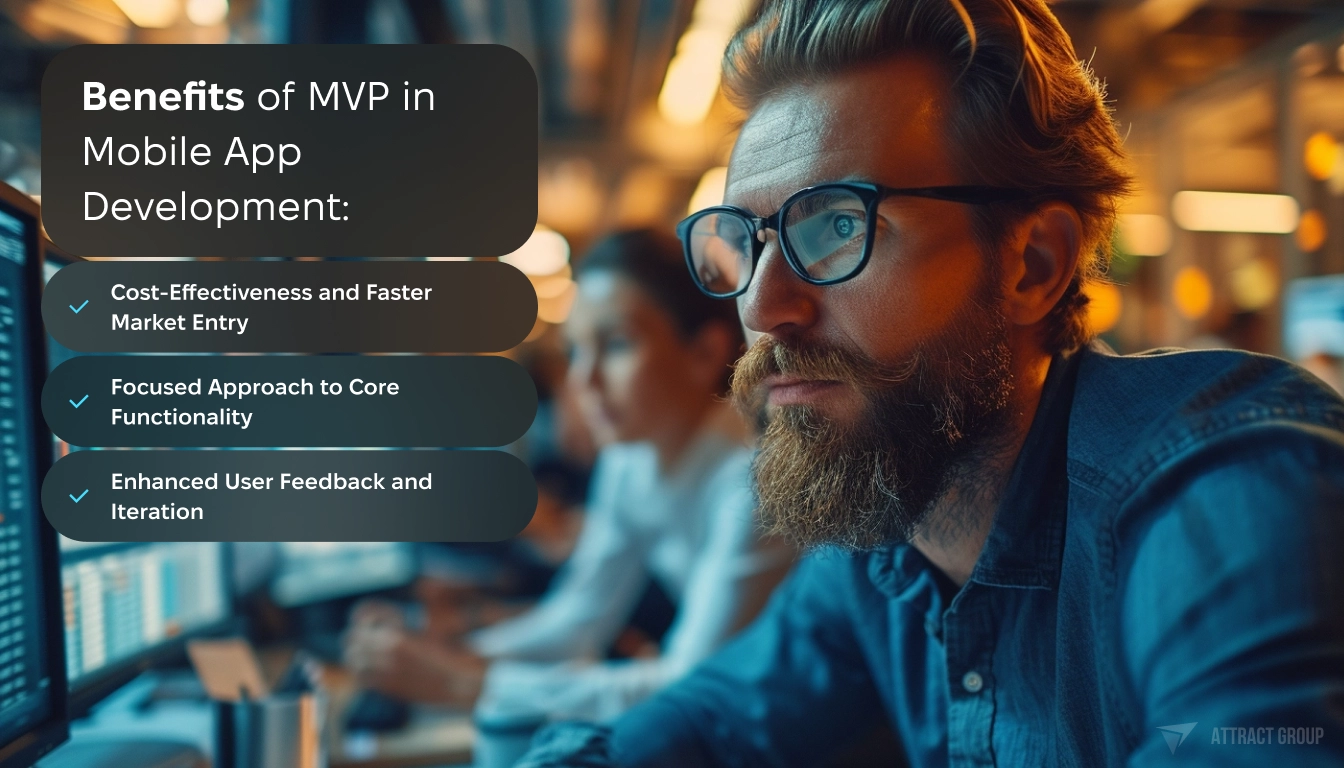🔊 Listen to the Summary of this article in Audio
The advent of successful apps such as Instagram, Uber, and Spotify has showcased the strategic prowess of starting small and agile. These behemoths of the app industry have one strategy in common – they all embraced MVP app development to test, iterate, and refine their offerings. MVP, standing for Minimum Viable Product, is a core principle of the lean startup methodology that espouses launching with just enough features to satisfy early adopters. This approach not only conserves resources but also enables a direct line of communication with users, providing actionable insights to guide a successful launch.
As a lean foundational model for launching digital offerings, MVP development is a pragmatic, customer-centric pathway to sift through the hypothetical and hone in on what users truly desire. With MVP, developers and entrepreneurs can align their vision with market expectations, steering clear of expensive missteps and focusing on validated learning from real interactions. This introductory glance at MVP sheds light on why it could very well be the cornerstone of your app’s success story.
Key Takeaways
- Understanding MVP app development is crucial for a lean and efficient route to market.
- Using real user feedback, MVPs help validate and grow your app effectively.
- MVP is the linchpin of the lean startup methodology, emphasizing rapid iteration.
- Successful app initiatives often start with a strategic MVP for a focused, risk-managed launch.
- MVPs are the first essential steps in crafting apps that resonate with real user needs.
Introduction to MVP in App Development
In the dynamic realm of mobile applications, launching a product that aligns with user expectations and market dynamics is pivotal. A cornerstone methodology that empowers developers to achieve such alignment is the MVP mobile app development process. MVP, or Minimum Viable Product, serves as the litmus test for new applications, enabling a critical connection with the target audience essential for app validation in the early stages of development.
Defining MVP: What is MVP in App Development?
At its heart, an MVP represents the purest essence of your mobile application, distilled to its most essential functionality. It is not merely a skeleton but a functional prototype that addresses the core problem it is designed to solve. By engaging directly with a target audience, MVP facilitates an eco-system where immediate user feedback becomes a guiding light for further development. This practice circumvents the common pitfalls of over-engineering and feature overload, which can misdirect resources and extend time-to-market unnecessarily.

The MVP approach is indicative of market agility – a way to quickly introduce an app concept into the competitive market landscape, gathering data and learning from actual usage. With the user feedback at hand, developers and entrepreneurs can iterate and expand upon the MVP, incrementally enhancing the app in a manner that resonates with the needs and wants of the end-users. Such an iterative process of build-measure-learn forms a feedback loop that is fundamental to the refinement and success of the mobile application.
While the MVP mobile app development process is cost-effective and mitigates risk, it also delivers another indispensable benefit: it substantiates the app concept’s legitimacy and market viability. This not only satisfies the curiosity of the developers but also builds credibility with investors and stakeholders who are keen to understand the potential of an app before fully committing to its journey. It’s a proof of concept that de-risks the investment and sets a strong foundation for the app’s trajectory.
Understanding and harnessing the power of the MVP is not just about launching a product; it’s about embracing a philosophy of user-centric design and development. In this agile era, where user preferences and market trends shift swiftly, an MVP empowers developers to remain flexible and responsive, ensuring their app remains relevant, engaging, and on the path to success.
The Rising Importance of MVP in 2023
As we advance through 2023, app development trends indicate a pivotal shift towards a methodology that’s not just efficient, but highly effective in aligning products with market expectations. This shift underscores the rising importance of creating an MVP, or Minimum Viable Product, in the bustling mobile app arena. As the landscape becomes more competitive and dynamic, understanding the role of MVPs in achieving real-world market validation is more crucial than ever.
Current Trends Influencing MVP Strategy
With an overwhelming surge in app downloads expected to reach a staggering 299 billion, the deployment of MVPs has become a central tactic for developers aiming to carve out a niche in an oversaturated market. As a pivotal component in app development trends, MVP prominence is driven by the need to stand out in an increasingly crowded space where user attention is a precious commodity. The MVP model provides a streamlined approach to app development, where the focus is on delivering core features that meet emerging user demands and preferences.
The importance of MVPs also lies in their flexibility. The capacity to adapt swiftly to user feedback and incorporate changes without overhauling the entire app framework means MVPs are custom-built for today’s fast-paced, user-centric app economy. This adaptability not only boosts the potential for a successful launch but does so in a manner that’s cost-effective and smartly attuned to the market’s pulse.
MVP’s Role in Modern App Development
App developers are increasingly recognizing MVP importance as an integral part of a product’s lifecycle. By focusing on MVPs, businesses can sync with market demand, and through rigorous testing with actual users, validate the viability of an app concept before committing significant resources. This practical approach minimizes risks while ensuring that the product aligns closely with the needs and expectations of its intended audience.
Echoing the need for speed and efficiency, MVPs offer a quicker time to market than traditional, fully-featured launches. This advantage is key in a landscape where early user adoption can make or break an app’s success. By collecting feedback early and often, developers can iterate more effectively, fine-tuning the app to market expectations and user preferences, thus paving the way for a robust, feature-rich final product that meets the mark both functionally and commercially.
Consult with our app developers to craft an effective MVP launch plan tailored to your product and target users.
Benefits of MVP in Mobile App Development
Embracing the concept of a Minimum Viable Product (MVP) in the mobile app realm offers a pathway to success that is both efficient and tailored to precise market needs. It is a strategic approach that leans into the advantages of rapid market testing and efficient development, establishing a user-focused foundation for the app’s evolution. Let’s delve into the specific benefits that underpin MVP’s integral role in app creation.

Cost-Effectiveness and Faster Market Entry
One of the most compelling MVP benefits for mobile app developers is the cost-effective nature of this development strategy. By focusing on developing the app’s core functionalities — those features deemed absolutely necessary for launch — developers avoid the high costs associated with creating a full-scale app. Additionally, entering the market faster means businesses can begin the learning process sooner, aligning offerings with user expectations and market developments.
Focused Approach to Core Functionality
A disciplined focus on essential features prevents ‘feature creep’ — the tendency to overbuild the first version with unnecessary extras. This focused approach ensures that the app remains lean and manageable, allowing for better control over the development process and resources invested. By concentrating on what’s truly important, the app reaches users quickly and efficiently, which is vital in a rapidly changing digital landscape.
Enhanced User Feedback and Iteration
The lean structure of an MVP is specifically designed to gather and implement user feedback effectively, fostering a highly responsive and iterative developmental approach. Entrusting early adopters to guide the app’s growth ensures that each added feature is a direct result of user demand or feedback, thus ensuring the app’s functions continue to meet — and adapt to — real-world needs.
In conclusion, the MVP model is a proven framework that offers a plethora of advantages, crucial for staying ahead in a market where timing and relevance are everything. From cost-effective development to rapid market testing, the merits of MVPs are clear. They provide a solid foundation from which an app can mature and evolve, becoming the best version of itself through a meticulously crafted development journey, shaped by its initial MVP roots.
MVP in Mobile App Development: A Closer Look
In the vibrant landscape of mobile app development, the MVP model stands as a beacon for efficient and targeted product launches. It is through the lens of the most successful mobile apps that we truly appreciate the nuanced architecture of an MVP. Here, we dissect the MVP components that are crucial for the transition from concept to market reality, exploring how they contribute to transformative mobile app success stories.
Key Components of a Successful Mobile App MVP
At the core of every MVP lies a strategic focus on essential MVP features. This foundational aspect is underlined by the inclusion of crucial functionalities that encapsulate the app’s main idea and promise. For instance, when Spotify first introduced its platform to the world, it did so with a rudimentary yet fully functional music streaming service. The emphasis was on delivering one core value: seamless access to music. Such an approach not only streamlined development — a low-cost endeavor efficiently realized within four months — but also guaranteed the provision of value, even in its most basic iteration.
- Core functionalities that effectively communicate the app’s main idea
- Value delivery in its most pared-down version
- Low-cost development to minimize financial risk
- An infrastructure that allows for future scalability

Case Studies: Successful MVPs in Mobile Apps
Various mobile app success stories underscore the pertinence of MVP development. Instagram, initially launched as a streamlined photo-sharing app, prioritized its distinctive filters and social connectivity over more complex features. Uber’s MVP revolved around the simple proposition of booking a ride with a tap on a smartphone screen, profoundly impacting the transportation industry. These cases vividly illustrate MVP’s role as a springboard, enabling rudimentary versions of apps to evolve into esteemed platforms through calculated iterations and enhancements.
After analyzing these success narratives, one cannot underestimate the influence of MVP components in the formative stages of an app’s life. By recognizing and incorporating these pivotal elements, developers and entrepreneurs can significantly enhance their odds of elevating a mobile app from a mere idea to a formidable contender in the app marketplace.
“The leanest, most participant-informed MVPs tend to pave the way for the most compelling and adaptable full-scale applications.”
Each case study propagates a common truth: an MVP’s success greatly hinges on its ability to resonate with its intended users, serving their immediate needs while holding the potential for future enrichment — a testament to the power of essential MVP features in sculpting the future of mobile applications.
Our team can build your MVP app to test your concept quickly and start gathering user feedback.
Challenges and Solutions in MVP App Development
The journey to a successful app often begins with a Minimum Viable Product (MVP), yet this path is ridden with potential stumbling blocks. MVP development challenges can derail an otherwise promising app, but with strategic MVP planning and a determination to overcome app development obstacles, these challenges can be turned into stepping stones for success. This pivotal phase involves not only careful ideation and validation but also the keen integration of user feedback, with the ultimate goal of being first to market with a product that truly resonates with users.
Identifying and Overcoming Common Obstacles
Embarking on MVP app development entails the anticipation and navigation of numerous hurdles. Through meticulous validation and iteration, developers can refine MVPs, ensuring they provide a compelling user experience that meets market demand. Common challenges include aligning product features with user needs, managing resource constraints, and making data-informed decisions that will steer the MVP in the right direction. Effective strategies to bypass these roadblocks include a robust feedback loop, a focus on essential features, and a clear vision for future development.
Here are some of the recognized hurdles and strategies for overcoming them:
- Limited Resources: Optimize your approach by focusing on core functionalities that address user needs without overextending budget and time.
- User Validation: Engage with your target audience early and often to validate your assumptions about user behavior and app utility.
- Scope Creep: Stay focused on the MVP’s objectives by resisting the urge to add non-essential features initially.
- Technical Debt: Make architectural decisions that are sustainable in the long run to avoid rework and maintain a high-quality codebase.
Strategic Planning for MVP Development
Strategic planning is the cornerstone of any successful MVP. It involves discerning which features are mandatory for launch versus those that can be developed later, based on user feedback and data-driven insights. A key part of this strategy is establishing MVP goals that are aligned with business objectives and user expectations. Another critical factor is accurately estimating timelines and budgets to ensure that the MVP can be delivered within the constraints of both.
| Challenge | Strategic Solution |
|---|---|
| Defining Minimum Requirements | Utilize market research and user personas to pinpoint the most vital features. |
| Managing Expectations | Communicate clearly with stakeholders about the MVP’s scope and potential growth. |
| Adapting to Feedback | Implement systems for collecting and incorporating user input seamlessly. |
| Timing the Launch | Balance development speed with quality to hit the market at an opportune moment. |
By systemically overcoming these common MVP development challenges, businesses can pave a clear path toward creating an app that not only enters the market swiftly but continues to evolve focused on user-driven insights — culminating in a product that is both impactful and enduring.
Leverage our expertise to avoid common MVP pitfalls and overcome development obstacles.
Future of MVP in App Development
As businesses and entrepreneurs continue to innovate in the ever-changing landscape of app development, MVP (Minimum Viable Product) remains a guiding strategy for success. MVP future predictions suggest a transformation in the way developers and startups approach product creation, heavily impacted by the evolving app strategies and ongoing technological influence on MVP. These advancements are set to reshape MVPs from being just a preliminary version of the product to a more strategic tool in garnering user engagement and investment.
Predictions and Evolving MVP Strategies
In light of recent trends and market demands, MVP strategies are poised to undergo significant evolution. Startups and established entities alike are expected to leverage MVPs not only to validate product concepts but also as a way to rapidly adapt to user feedback and market shifts. The essence of MVP’s design-to-value approach is predicted to intensify, with developers putting an even greater emphasis on understanding user behaviors, needs, and preferences from the earliest development stages.
One emerging strategy is the increased use of data analytics and user behavior prediction models to refine MVP features, which allows for a more precise and impactful first iteration of the app. By doing so, developers can tailor their offerings to user expectations with greater accuracy, thereby enhancing the MVP’s effectiveness as a market entry tool.

Technological Advances Shaping MVPs
Technological innovation plays a critical role in the ongoing refinement of MVP methodologies. For instance, the integration of artificial intelligence and machine learning algorithms into the MVP development process is enabling more sophisticated analysis of user data. This technological influence on MVP paves the way for enhancements that are genuinely user-centric, optimizing the features included in the MVP based on predictive behaviors and analytics.
Moreover, advancements in cloud technologies are allowing for seamless scalability of MVPs, addressing one of the traditional criticisms of the MVP approach — its perceived lack of robustness. With the cloud’s flexibility, MVPs can now be developed with the potential for rapid scaling, enabling startups to efficiently expand their app’s capabilities in response to positive market reception and demand.
Looking to the horizon, it’s evident that MVP development stands at the precipice of an era marked by adaptive strategies and influential technologies. Businesses that correctly interpret and apply these trends will likely see the most success, turning nuanced insights into enviable market positions. As with any predictions, only time will provide clarity, but the future undeniably holds a wealth of possibilities for those invested in the ethos of MVP app development.
Conclusion: The Strategic Advantage of MVPs in App Development
The inception of an app idea is a journey fraught with uncertainties—a path MVPs help illuminate. By providing a strategic advantage, the MVP model ensures that the initial app version captures the essence of lean development while scaled-down functionalities lend themselves to rigorous real-world feedback. Through these targeted insights, the MVP’s lean development benefits become apparent, allowing entrepreneurs to hone in on what truly matters to their end users. It is the hallmark of MVP’s app idea validation, turning conjectures into verified truths that resonate with customers.
Lean MVP design aligns closely with market needs, shedding excess to maintain focus on primary functions that are crucial for user adoption. This is not simply about cost-saving measures—it is a strategic pivot towards creating a product with a higher potential to fulfill its market’s needs without the hefty investments often associated with more elaborate roll-outs.
As the MVP evolves, injected with user-driven enhancements, its journey from a simple prototype to a fully-fledged product is both agile and informed. This course of development, lit by the guiding star of customer interaction, leads to an organic growth — often a rarity in the market’s pressured timelines.
| Strategic Element | Benefit to App Development |
|---|---|
| Core Feature Focus | Concentrated effort where it matters most leads to effective use of resources. |
| User Feedback Integration | Directing the development path with real-world usage data. |
| Market Entry Speed | Faster launch times equating to timely market presence. |
| Investment Efficiency | Financial prudence through validated features that users are willing to pay for. |
Thus, the MVP champions a fundamental shift in product development philosophy: it tethers the ambitious to the practical, the visionary to the user-centric. By bolstering app development with MVP, businesses anchor their projects not just with strategic insight but with the tangible proof of their app’s potential. In a landscape replete with competition and rapid innovation, MVPs stand strong as enduring bastions of app development sagacity.
Our agile developers can build, launch, and iterate your MVP efficiently.
FAQ
What is an MVP in App Development?
An MVP, or Minimum Viable Product, in app development is the most basic version of a mobile app that includes core functionalities necessary to meet the needs of early users and validate the app concept in a real-world environment.
Why is MVP app development important in 2023?
With the number of mobile app downloads projected to reach 299 billion in 2023, MVP app development is crucial for standing out in a crowded market, being cost-effective, and aligning products with user needs through real-world feedback.
What are the benefits of developing an MVP for mobile apps?
The benefits of MVP development for mobile apps include cost-effectiveness, faster time to market, reduced risk, a focused approach on core functionalities, and the collection of user feedback for iterative improvement and optimal product-market fit.
How does an MVP contribute to the success of mobile apps like Spotify?
MVPs contribute to success by allowing developers to launch apps with fundamental features, like Spotify’s basic music streaming service, and then expand upon them based on user feedback while keeping development costs and timelines short.
What are the key components of a successful mobile app MVP?
Successful mobile app MVPs consist of core functionalities that clearly communicate the app’s value proposition, provide immediate value to users, and are developed with a lean budget and time frame in mind, creating a solid foundation for future features and updates.
How can businesses overcome challenges during MVP app development?
Overcoming challenges in MVP app development involves conducting thorough market validation, incorporating user feedback to refine the app, and strategically planning each iteration to be responsive to both users and market demands.
What strategic advantages do MVPs offer in the app development process?
MVPs offer strategic advantages such as reduced initial investment and risk, faster feedback loops from real users, and the ability to rapidly adapt to the market, leading to a more successful and user-centric final product.
How is MVP app development expected to evolve with future technological advancements?
As technology advances, MVP app development is expected to evolve with new strategies for validation and streamlining the development process, ensuring that MVPs are highly adaptable to ever-changing market needs and user feedback.









